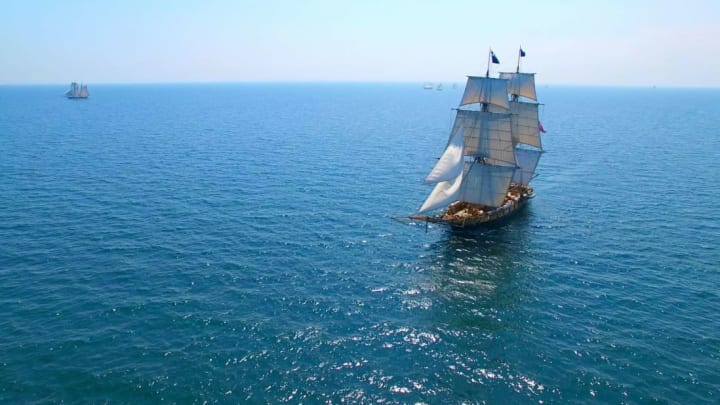Even if you're a landlubber who has never set foot on a paddleboat, you most likely sprinkle your everyday conversation with nautical-inspired phrases. Here are some terms you can thank a sailor for.
1. Taken Aback
Aback is what sailors say when the wind acts on the front of a sail, pressing it against the mast. Sometimes this is deliberate, but other times through inattention or sudden changes in weather it happens accidentally—the ship is “taken aback.”
2. Cut and Run
It’s believed that this phrase originates from sailors who were in such a hurry that they cut the anchor rather than hauling it up, then “ran” with the wind.
3. Pass With Flying Colors
When a ship (or an army) had a great victory, they would raise the regimental flag to show their success.
4. Hand Over Fist
Although we typically use this phrase to refer to making money, it really just means to make fast and continuous progress, like when you quickly haul something up with a rope, hand over fist.
5. Left High and Dry
No support? No resources? Then you just might be high and dry, like a ship that’s been grounded because the tide went back out.
6. Three Sheets to/in the Wind
The ropes or chains that control the tension in the sails are called “sheets.” There are a few different explanations for what the three sheets are or aren’t doing in the saying, but they all agree the end result is a boat that lurches around like Captain Jack Sparrow after a rum binge. (The older version is three sheets in the wind, but over the past few decades that’s fallen out of favor for three sheets to the wind, possibly because people mistakenly thought the “sheets” are in reference to sails.)
7. Groggy
Eighteenth century Admiral Edward Vernon supposedly wore a grogram cloak, earning him the nickname “Old Grog.” In 1740, he issued an order that his sailors’ rum rations be mixed with water, creating a mixture that was called “grog,” after the Admiral’s nickname. If you had a bit too much grog, you might become ... groggy. (Fun fact: Vernon had under his command an admirer named Lawrence Washington, who would rename his property after the Admiral. Eventually, the property passed to his half-brother George, which is why George Washington’s estate is called Mount Vernon.)
8. By and Large
Both “by” and “large” are nautical terms. To sail “by” means to sail a ship very close to the line of the wind, and to sail “large” means the wind is on the quarter. Sailing “by and large” meant you could sail either with the wind or against it.
9. Slush Fund
When ship cooks finished making meals and had a sludgy mix of grease and fat left over, they would take the slush and store it until they got to port. In theory this fat came from the crew’s rations, so any money made should have been paid out to the sailors—but one 1839 book explains that this didn’t happen and instead was pooled to be spent on non-regulation items for the ship, like carpets or musical instruments.
10. Scuttlebutt
It’s a given in any office that there’s going to be some gossiping around the water cooler, and that was also true on a ship in the 19th century. Except there, the water cooler was named the scuttlebutt—butt being a name for a large cask/barrel, and scuttle meaning it had a hole cut in it.
11. Run a Tight Ship
An orderly ship is one with tight ropes and secure rigging.
A version of this story ran in 2014; it has been updated for 2021.
